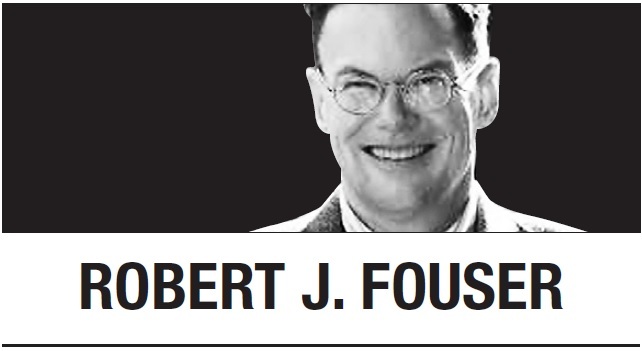[Robert J. Fouser] An early look at 2022 election
By Robert J. FouserPublished : July 2, 2021 - 05:31

Aside from the pandemic, the big story in the second half of the year will be the unfolding political landscape in the lead-up to the presidential election on March 9. Three big questions loom: the pandemic, the national mood, and the candidates.
The pace of vaccination has picked up in South Korea and the nation is now on track to reach a high percentage of vaccination by the end of the year. Complaints about the slow vaccine rollout in the spring will fade as restrictions are lifted and people resume pre-pandemic activities. President Moon Jae-in and his Democratic Party should benefit from the improved situation. After dipping into the low 30 percent range in the spring, Moon’s approval rating now hovers around 40 percent. An uptick in approval ratings at the end of a presidential term is rare and suggests that the public is rewarding him as the vaccinations pick up.
Recent concern over the spread of the highly contagious delta variant, however, underscores that fragility of the situation. Fortunately, the current crop of vaccines appears to be effective against it, but it has caused a new round of lockdowns and restrictions. Israel reimposed an indoor mask mandate 10 days after lifting it. Four major cities, including Sydney and Melbourne, in Australia went into lockdown over to prevent the spread of the delta variant. With experience of successful mitigation and now vaccination, South Korea is in good shape to weather the storm, but problems elsewhere could dampen the economic recovery.
As in other democracies, national moods in South Korea are fickle and containing contrary strands. Vaccinations and an improving economy, for example, should help the ruling Democratic Party. South Korea has a higher percentage of self-employed workers than other major democracies. This large pool of voters is sensitive to economic conditions and government policy and vote for or against incumbent parties accordingly.
Older voters over 65 form the bedrock of conservativism in South Korea. They have long taken a hard line on North Korea and have conservative attitudes on social issues. Since the pandemic, efforts to engage North Korea have stalled and North Korea itself has remained unusually quiet. If this continues, North Korea will be less of an issue in the campaign, making it harder to rally persuadable older voters to the conservative side.
The by-elections in April this year revealed that older voters are not the only group to lean conservative. Men in their 20s overwhelmingly supported conservative candidates. Women in their 20s went in the opposite direction, creating a gaping gender gap. Hoping to capitalize on this trend, the conservative People Power Party recently chose the 36-year-old “anti-feminist” Lee Jun-seok to lead the party. This trend runs contrary to long-standing trends in voting behavior in many democracies, suggesting that it might not be as durable as conservative optimists believe.
The biggest variable, of course, is the candidates. Party loyalty in South Korea is not as strong as in many other democracies, freeing voters to look at subjective factors such as personality. Currently, the Democratic Party has three leading contenders: Chung Sye-kyun and Lee Nak-yon, both former prime ministers and Lee Jae-myung, governor of Gyeonggi Province. Gov. Lee ran for the Democratic Party nomination in 2017, but was easily defeated by Moon Jae-in. The other two are both former and incumbent prime ministers with years of experience in national government. In his 2017 run, Gov. Lee was known for his populist views and was often compared to Donald Trump or Bernie Sanders.
On the conservative side, the situation is murkier, but Yoon Seok-youl, a former prosecutor general with no political experience, has formally declared his candidacy and appears firmly in the lead. Ahn Cheol-soo, who came in a close third in the 2017 election, is rumored to be considering a run.
Past elections since 1987 suggest that a charismatic candidate, often with a colorful life story, who unites sympathetic political groups always wins. Charisma or unity alone are not enough.
Robert J. Fouser
Robert J. Fouser, a former associate professor of Korean language education at Seoul National University, writes on Korea from Pawtucket, Rhode Island. He can be reached at robertjfouser@gmail.com -- Ed.



















![[Today’s K-pop] BTS pop-up event to come to Seoul](http://res.heraldm.com/phpwas/restmb_idxmake.php?idx=642&simg=/content/image/2024/04/17/20240417050734_0.jpg&u=)